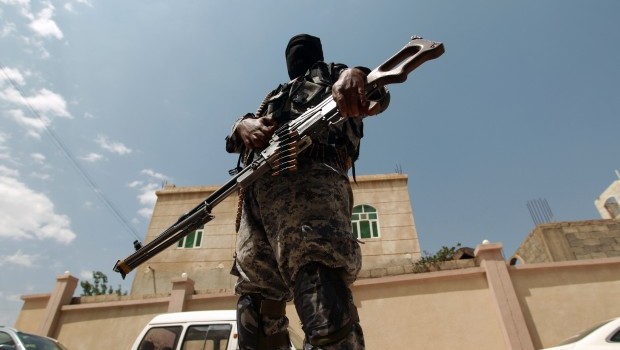
A Yemeni security officer stands guard during the first hearing on August 26, 2013 in the case of the June 2011 bombing of the Yemeni presidential palace outside the state security court in Sanaa. (AFP PHOTO/ MOHAMMED HUWAIS)
Sources in Abyan, speaking on a condition of anonymity, told Asharq Al-Awsat that clashes erupted in the Batis area between armed groups affiliated with Al-Qaeda and armed members of the pro-government Popular Committees, resulting in the deaths of three members of Al-Qaeda.
The sources said the two groups came together by chance when Al-Qaeda members targeted a leader of one of the Popular Committees in that area. The two groups have been fighting for three years, since the formation of the Popular Committees to support the government forces. Al-Qaeda killed dozens of its members in suicide attacks in a number of areas in Abyan, in revenge for the contribution of those committees to the failure of the establishment of two Islamic emirates in Abyan and Shabwa.
In the meantime, the National Dialogue Conference in Yemen continues to face obstacles following the boycott by Southern parties of the conference more than a month ago, and their demand to transfer the remainder of the conference away from Sana’a, especially for sessions related to the south.
Genenral Hatem Abu Hatem, a leading figure in the Joint Meeting Parties and member of the army team at the National Dialogue Conference, said there were many obstacles facing the conference, and that “if the Yemeni issue was not resolved by Yemenis themselves, it would become more internationalized that it was already.”
He warned that “the international community will not agree with the chaos and instability and will interfere to solve the problems in a way which served its interests.”
Abu Hatem told Asharq Al-Awsat that Al-Qaeda “was sponsored by powerful forces within the regime before the ouster of former President Ali Abdallah Salih,” and that Al-Qaeda was dealt “a severe blow when the army and Popular Committees declared war on the group in Abyan.”
He also admitted that “the process of restructuring the security forces was lagging behind the process of restructuring the army in Yemen,” adding that there were many difficulties in this regard and that the state’s resources were very limited.
Abu Hatem, a leading figure in the Nasserist Popular Unity Organization, criticized the power-sharing system in the National Accord Government, which is chaired by the Joint Meeting Parties bloc, adding that they did not take any tangible steps to fight corruption.
He called for “the formation of a technocratic government, or a national salvation government, which will be able to work effectively, whether in restructuring the armed forces and security forces, or by eradicating corruption, improving the lives of citizens, and implementing the 31 points agreed on by the National Dialogue Conference, related to the issues of the South and Sa’adah.”
